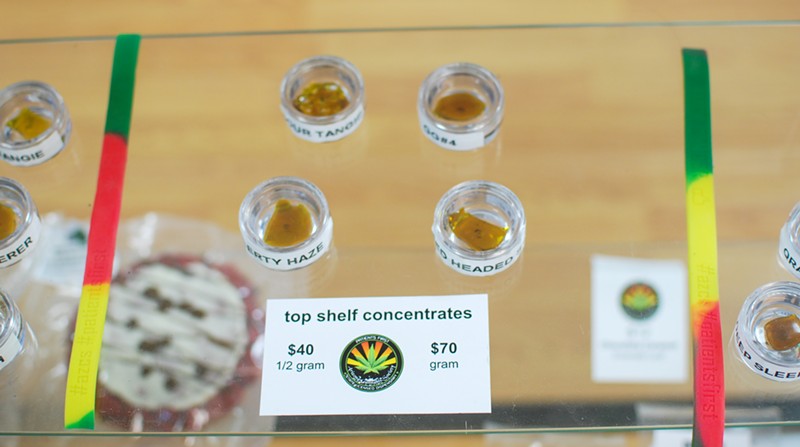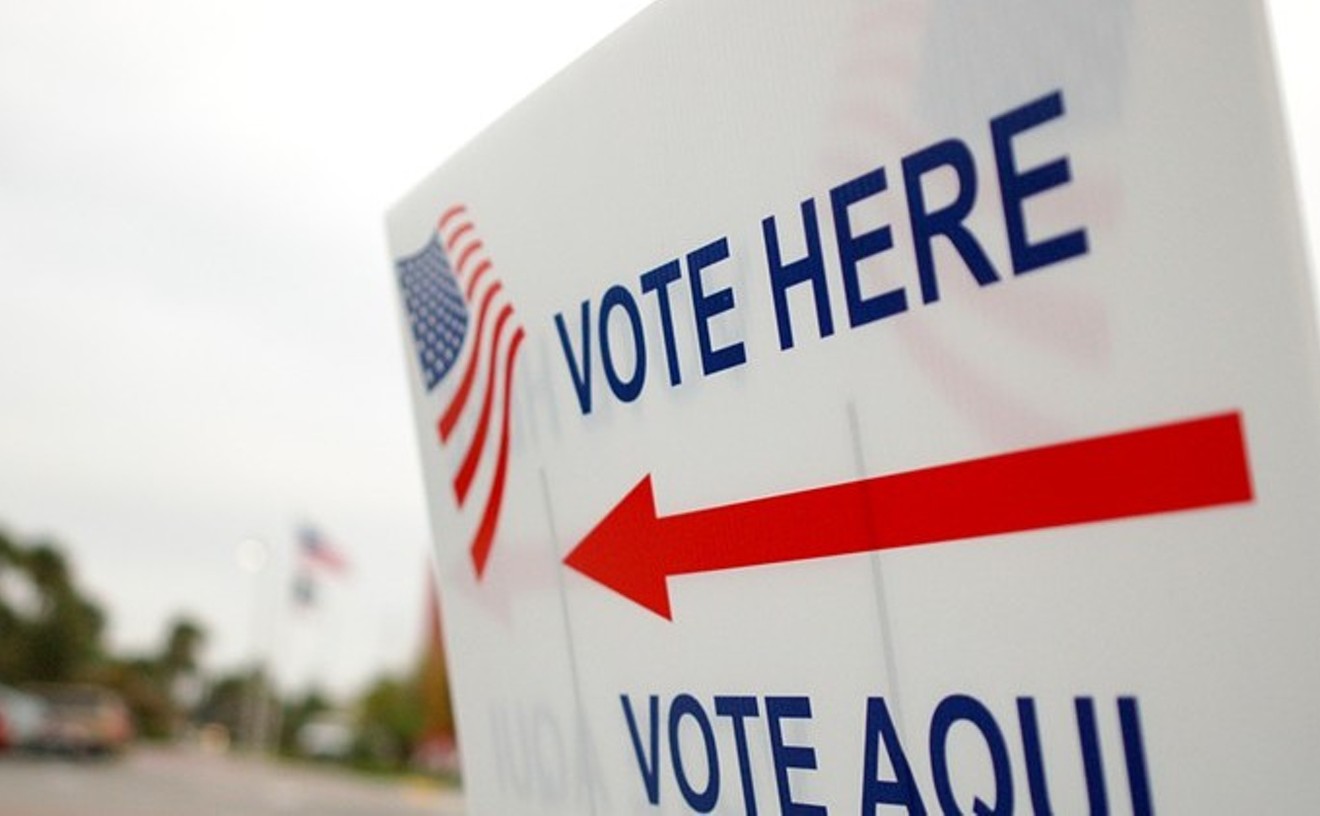Arizona legislators are pushing for an end run around the Arizona Court of Appeals' controversial decision last year that declared medical-marijuana patients couldn't possess extracts like hash oil and wax.
Medical-marijuana patients and the burgeoning dispensary industry are anxious for legal clarity on popular cannabis products made from the extracted resin of cannabis plants. The Arizona Supreme Court has granted a petition of review of the lower court's decision. Oral arguments are scheduled for March.
Meanwhile, a new bill from the assistant Democratic minority leader in the House would amend the definition of marijuana under the medical-marijuana law to include extracts.
A different bill from a Republican lawmaker favors the approach of redefining marijuana in Arizona's criminal statutes, thus avoiding the super-majority vote required to amend the voter-protected Arizona Medical Marijuana Act (AMMA.)
At issue in the Court of Appeals decision was the case of Rodney Jones, a card-holding medical marijuana patient arrested in Prescott in 2013. Jones was charged with felony cannabis possession for a jar that held 0.05 ounces of hashish, and later sentenced to 2.5 years in prison.
In a decision upholding Jones' conviction, the court ruled in June that extracts were not protected under the AMMA. Judge Jon W. Thompson, writing for the majority in the Court of Appeals decision, wrote that the AMMA is "silent" on hashish.
Under the AMMA, legal marijuana consists of "the dried flowers of the marijuana plant, and any mixture or preparation thereof," but this does not include "the seeds, stalks, and roots of the plant."
A bill sponsored by Democratic Representative Randy Friese, HB 2537, would amend the definition of marijuana to explicitly include "marijuana that is cultivated, processed, dispensed, tested or possessed for a medical use, including medical marijuana extract and medical marijuana products" such as shatter, wax, and oils.
But Friese says other the bill's provisions, which mandate improved testing and regulation of dispensaries, were the primary motivation for the legislation.
The bill would direct the Arizona Department of Health Services to adopt rules requiring testing of the products sold by medical-marijuana dispensaries by the department and third-party laboratories. Testing would determine if the marijuana products contain harmful chemicals, bacteria, mold, or heavy metals.
When Arizona legalizes recreational marijuana, Friese said the state will see a larger volume of cannabis sales, meaning that the state needs to hammer out safeguards now.
"While we're doing that, let's also think about [how to] get people comfortable with redefining what medical marijuana is to address the issue" of the Court of Appeals ruling, Friese told Phoenix New Times on Wednesday.
Because Friese's bill will amend the voter-protected AMMA, the measure will require a three-fourths vote in the Legislature to comply with the 1998 Voter Protection Act, which prevents lawmakers from easily tampering with voter-approved laws.
Another bill, this one from Representative Tony Rivero, a Republican from Peoria, would undo the Court of Appeals ruling through a different maneuver.
Rivero's HB 2149 would amend Arizona's criminal code, rewriting the definition of marijuana to include cannabis extracts. He recently told the Arizona Capitol Times he hopes to avoid a situation where patients who rely on extracts are forced to smoke marijuana instead.
The bill also avoids the super-majority requirement needed to amend the AMMA, improving the likelihood that it could pass. Rivero did not respond to a request for comment.
In a recent roundup of cannabis-related bills, the Arizona chapter of the National Organization for the Reform of Marijuana Laws (NORML) called Rivero's proposal the most relevant bill to the patient community and medical-marijuana industry so far in the 54th Legislature.
A similar bill to include cannabis resin under the definition of marijuana in the criminal statutes is sponsored by Democratic Representative Pam Powers Hannley and a long list of a Democratic co-sponsors, plus two Republicans.
Mikel Weisser, the Arizona state director for NORML, said he is confident that the reading of the law to protect extracts will prevail at the Arizona Supreme Court. But the court will not hear oral arguments until March 19, and justices often take months to issue decisions, dragging out the process for patients.
Medical-marijuana users "could have relief many months earlier" because of the legislation, Weisser said.
Friese, a doctor who serves as the assistant minority leader for the House Democrats, said that he is aware of the upcoming Supreme Court review of the Court of Appeals ruling. But he emphasized that it wasn't his intention to address the hashish question before the Supreme Court decides.
"I wanted to include a piece of that in here because in my view, if we're going to say it's medical marijuana, then it is a product people are using as a medication," Friese said. "And if people are using the oils and the distillates and the topicals, then that should also be included."
Whether his effort succeeds is another question. The three-fourths majority required to amend the AMMA is a high bar, and measures to increase regulation have failed before. A bill to mandate testing at dispensaries failed during the previous legislature session after Republicans removed a proposed reduction in the price of medical-marijuana cards, causing Democrats to vote against it.
Friese said he has been working on his bill since last summer, and met with stakeholders on Wednesday morning. He has also spoken with the chairs of the Health and Commerce committees in the House.
"There is a void in the regulations that allow this product to be out there for patients to use without assurances that it's safe," Friese said.
[
{
"name": "Air - MediumRectangle - Inline Content - Mobile Display Size",
"component": "18478561",
"insertPoint": "2",
"requiredCountToDisplay": "2"
},{
"name": "Editor Picks",
"component": "16759093",
"insertPoint": "4",
"requiredCountToDisplay": "1"
},{
"name": "Inline Links",
"component": "17980324",
"insertPoint": "8th",
"startingPoint": 8,
"requiredCountToDisplay": "7",
"maxInsertions": 25
},{
"name": "Air - MediumRectangle - Combo - Inline Content",
"component": "16759092",
"insertPoint": "8th",
"startingPoint": 8,
"requiredCountToDisplay": "7",
"maxInsertions": 25
},{
"name": "Inline Links",
"component": "17980324",
"insertPoint": "8th",
"startingPoint": 12,
"requiredCountToDisplay": "11",
"maxInsertions": 24
},{
"name": "Air - Leaderboard Tower - Combo - Inline Content",
"component": "16759094",
"insertPoint": "8th",
"startingPoint": 12,
"requiredCountToDisplay": "11",
"maxInsertions": 24
}
]













